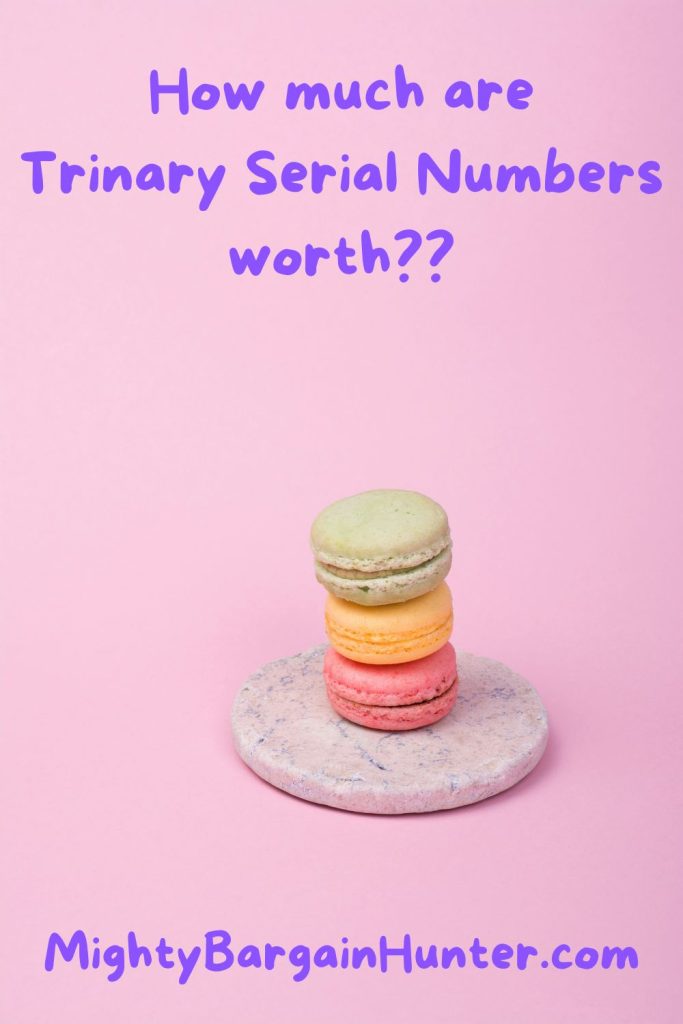Trinary serial numbers: What are they worth?
Some of the most popular posts on this website lately have been about currency — particularly fancy serial numbers and errors.
I continue to get a lot of questions through email and on the Facebook group about what kinds of bills are worth more than face value.
This post concentrates on a kind of serial number that’s common enough that more experienced collectors probably wouldn’t save them. Nonetheless, there is a good market for them on eBay.
Trinary serial numbers for the new collector
More experienced collectors oftentimes say that these kinds of bills are not fancy or that they’re “spenders,” meaning that their only value is their face value.
As with most hobbies, there are people just starting out, people who have been at the hobby for decades, and everything in between. And, correspondingly, there are different kinds of bills that match the different levels of experience.
Trinary serial numbers are the “beginning-level collector” serial numbers that the subject of this article.
How rare is a trinary serial number?
Fancy serial numbers in general have some kind of collector’s value because they’re “cool” in some way.
Some kinds of fancy serial numbers are based on the number of different digits in the serial number. Solid serial numbers have exactly one digit, like 77777777. Binary serial numbers have exactly two digits, like 24244424.
Then there’s the next level, which is often called trinary, and these kinds of bills have exactly three digits in them.
A couple of examples of trinary serial numbers are 22313221 and 01120100, shown below:

The odds of a serial number being solid are about 1 in 11 million. The odds are getting a serial number that’s binary is about one in ten thousand or so.
Trinary bills are significantly easier to come by, though not especially easy. About 7 bills in 1,000 have trinary serial numbers.
Defending trinary serial numbers (haha!)
On my fancy serial number Facebook group I take the stance that trinaries are still worth above face value.
A lot of other collectors will say things that imply that it’s not worth their time to worry about these kinds of bills.
To some extent, they’re correct, because a run-of-the-mill trinary serial number will only be worth a few dollars on eBay. And, after subtracting out the value of the bill, fees, and shipping, the profit potential is maybe a couple of bucks.
A serious dealer isn’t going to waste their time for a buck or two. I get that. But the collectors that I see posting these kinds of bills are brand-new, curious, and probably a little bit excited. So selling the bill for a couple of bucks profit would be awesome, really. (When I sold my first ebook for the first time, I was giddy. It’s the real deal!)
Why try to sell trinary serial numbers?
So now I’ve outed myself as someone who thinks these are worth selling. Here are a few more reasons why I try not to dismiss these kinds of bills even if by more rigid standards they’re not among the fanciest:
People like to win if they’re pursuing something
First, people like to win if they’re pursuing something. I’ve gone through several thousand dollars worth of $1 bills and I have yet to find anything like a repeater serial number or a radar serial number. (These are typically agreed to be fancy, even by the more picky collectors.)
Even though many experienced collectors will not waste their time on these bills, there are many other starting collectors that do.
People list them on eBay, and there are willing buyers for these kinds of bills. Ignoring this market doesn’t make it go away.
If someone gets a few dollars by selling something they just happened to find in their wallet, they’re going to feel great about it — even if they spent an hour listing the bill, managing the auction, and mailing it out to the buyer. This kind of success breeds more success, and it’s addictive, really! This will encourage them to continue doing it and eventually they may take greater risks looking for these bills and selling them.
It encourages the hobby in newer collectors
Second, it’s a way to encourage the hobby with people who have never done it before. Everyone has to start somewhere.
People will (generally) not go out and buy graded bills right off the bat. They’ll start with the kinds of bills that they see every day.
And today’s casual collector of these kinds of bills may become tomorrow’s collector of fence your bills which benefits the experienced collectors.
It expands the currency-collecting hobby
The last reason that I encourage and point out these kinds of things is that it helps to expand a hobby a bit.
I think that a lot of the higher-end collectors don’t really look at more than a very narrow set of bills. The hobby could be much bigger because it really is so easy to get started.
It’s an easy way to learn about reselling!
This reason is a bit apart from collecting.
When starting on a new way to make additional income it’s wise to start smaller. There’s not a whole lot of downside to selling a dollar bill for a few bucks. The investment is minimal, and if something goes wrong it’s not a big loss. All in all, it’s a good way to practice selling something on eBay!



